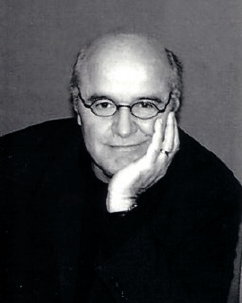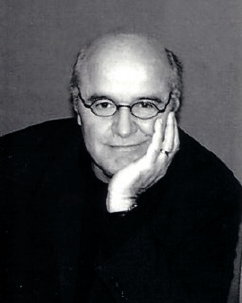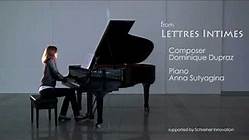Great to have you back!

2
Videos
About
Music, like other arts, expresses the indescribable, the unutterable and the most profound and faraway “inner spaces” of the soul.
Dominique Dupraz studied music in Paris at the Conservatoire Serge Rachmaninoff, as well as at the Sorbonne, where he obtained the title Docteur d'Etat ès Lettres in musicology. His teaching activities rapidly led him to create the music courses Musique en Vivarais and Musique en Vendée. During these courses he conducted the orchestra classes and gave talks on Beethoven's symphonies. For many years he conducted the modern music ensemble Horizons Sonores XXI (Sound Horizons XXI), which gave numerous performances, mainly in Paris. His musical compositions for piano, voice and piano, string quartets, choirs and symphony orchestras, as well as for many other instruments, including the Crystal and Tibetan bowls, were given their first performances in France, Belgium, Luxemburg, England and the Czech Republic.
Sheets
Interview
What does music mean to you personally?
Music, like other arts, expresses the indescribable, the unutterable and the most profound and faraway “inner spaces” of the soul.
Do you agree that music is all about fantasy?
Music is an art which can take many and various forms : it can be entertaining, descriptive, contemplative, spiritual, mystic etc.. It concerns everyone, and each of us when listening, can take what he wants and above all what he can, irrespective of his or her cultural level but according to one’s perception of often very complex sounds requiring an effort of concentration, which is missing in our 21st century, notably with young audiences.
If you were not a professional musician, would would you have been?
I think that since I was a teenager I was destined to compose music. Later on, I devoted my time to the elaboration of a musical work. The encounter with my mentor, Jean Catoire, professor of music composition at the Sergei Rachmaninoff Russian Conservatory of Paris was a deciding factor in the early seventies.
The classical music audience is getting old, are you worried about the future?
Classical music does not receive the same media coverage as pop music, rock or others…Generally speaking, the human mind prefers the easy option to that not immediately perceptible. 3 guitar chords of a song are easier to hear and understand than the harmony of a composer like Scriabine, for instance, or the sounds of the dodecaphonists!
What do you envision the role of classical music to be in the 21 century? Do you see that there is a transformation of his role?
So-called “contemporary” music was not well accepted by the general public in the second half of the 20th century, because it was considered too elitist, abstract, and meaningless. Baroque, classical and romantic music have become popular, because they are charged with universal and timeless emotions which are immediately perceptible.
When I say that classical music is searching for new ways or that the classical music is getting a new face, what would come to your mind ?
Now, some classical music seeks to reconnect with the public using emotion and not a technical, artificial musical language. The Belgian musical movement ”New consonant music” is a striking example! For almost 30 years, it has brought together composers using various musical forms but all aiming at reconnecting with the public.
Do you think that the classical musicians today need to be more creative? What is the role of creativity in the musical process for you?
No, contemporary classical music does not need more creativity. Creativity is everywhere. The composer simply needs better media coverage to (almost) compete on a level playing field with pop singers. Moreover, creativity at all costs does not mean originality: creativity is not only to do what you want but above all to want what you do.
Do you think we musicians can do something to attract young generation into the classical music concerts? How will you proceed?
My opinion is that live music concert is a very good means to attract young audiences. It is the same relationship between a match on the central Roland Garros court, and a televised tennis match! Personal experience is the key of pedagogy for adults as well as for children.
Tell us about your creative process. Do you have your favorite piece (written by you), how did you start working on it?
My creative process uses a technical classical language (consonant harmonies), major or minor, strong melodic structure, simple and various rhythms, often using an atonal music system (ex: “Sous un ciel étoilé” for piano). Other music pieces are definitely tonal (“24 préludes”) and convey what is essential to me: the Idea, whether existential, emotional, descriptive, mystic or other….
We, Moving Classics TV, love the combination of classical music with different disciplines: music and painting and cinematography, music and digital art, music and poetry. What do you think about these combinations?
I do like the association of music and poetry - cf “Leopoldine” for piano and soprano based on the verses of Victor Hugo, music and littérature - cf “Les lettres de Vincent Van Gogh à son frère Theo” for actor and piano, music and architecture - cf « Un vaisseau de lumière » for trio, about Le Corbusier’s Ronchamp chapel, music and painting - cf my opera « Vincent Van Gogh » on his life. These links between all the arts are very enriching for my creativity !
Can you give some advice for young people who wants to discover classical music for themselves?
It’s not Art which has to seek out the audience, it is the audience which has to come to Art! If the artistic “carthasis” - i.e. the effect of work of art on the public - can be guided by an more enlightened spirit (teacher, speaker, art critic and others), this catharsis must take place in the most personal and individual manner as possible deep within the listener/ spectator.
Now it is common practice in the media to talk that the classical music is getting into the consumption business, do you agree? We are speaking about the supply and demand rules and how to sell your “product” in your case your compositions. How do you see it?
For the composer, it’s all about the question of his musical career. The career must be the consequence of his work. The use of music by businesses can be beneficial (CD, movies) as well as detrimental (advertising). In this regard, French copyright is well protected by the SACEM (Société des Auteurs Compositeurs et Editeurs de Musique). The composer is free to choose among the various vectors to commercialize his work.
Do you have expectations what regards your listeners, your audience?
I consider that writing music is not primarily intended for the audience. It is the composer’s inner need to address himself to his Muse, music! A composer worthy of the name must not use the music but serve it as closely as possible through his work. Unfortunately, the listener most often does not judge the music score but rather the musician who is performing it. The composer who does not play his own music is practically unknown to the general public….!
What projects are coming up? Do you experiment in your projects?
My upcoming projects are the creation in Paris of my 13 pieces for piano, called “les Vitraux de Saint Maximin de Metz” on stained glass windows by Jean Cocteau and if possible, the creation of my 3 act opera “ Vincent Van Gogh”.
Copyrights © 2019 Moving Classics TV All Rights Reserved.

